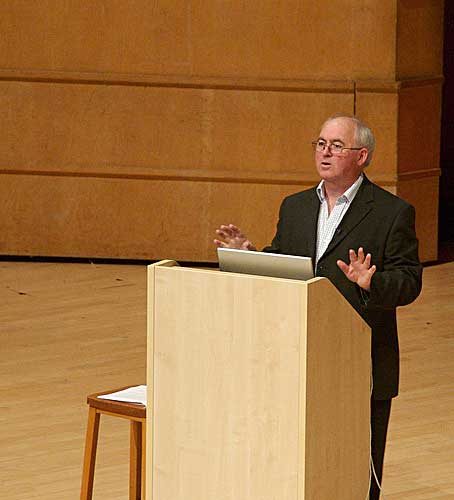Here’s the BBC’s sing-song Business Editor, Robert Peston, blogging about the banking crisis. First he says that:
the Bank of England consistently said that its system for providing liquidity didn’t need overhauling.
It claimed that to do so would be to bail out banks which had lent or invested in an injudicious way – and it had no intention of doing that.
It has now changed its mind.
The Bank has agreed to accept mortgages from banks as collateral against three month loans.
Baffled?
It’s the equivalent of opening up a whole new reservoir in the water system.
But here’s the humiliation for the Bank.
If it had done this three weeks ago when banks were clamouring, Northern Rock might never have feared that it was running out of money.
So it would not have had to approach the Bank of England for emergency support.
And there would never have been that infamous run on Northern Rock – the first run on a British bank for 140 years.
The possibility that the flight of capital from Northern Rock could have been avoided is seriously embarassing for the Governor of the Bank of England, Mervyn King, one of whose functions is to maintain financial stability…
But then, further down the same post, we find this:
IMPORTANT UPDATE: 19:59 The Bank of England has now told me that individual banks can only apply for £1.5bn each under the £10bn facility. It says that Northern Rock would have needed far greater funds – and that if this finance had been provided three weeks ago or so, the liquidity would not have eliminated the Rock’s funding difficulties.
Which comprehensively up-ends his argument. But dear old Peston can’t quite bring himself to admit that he’s got it wrong. He continues:
It is slightly odd that the Bank should divulge this to me now, because it failed to provide this detail (or any answer at all) when I asked this afternoon whether what it announced today could have provided succour to Northern Rock. So although the Bank of England has changed course in respect of the way it is prepared to tackle the crisis in the money markets, it is sticking to the position that it has no regrets about the way that it provided its initial support to Northern Rock.
This is lazy, incompetent journalism. What’s actually going on is that Peston and other hacks are — wittingly or unwittingly — being co-opted into scapegoating the Bank of England Governor, Mervyn King, who is the only person in the drama so far to have acted with intelligence and judgement. The managers and Board of Northern Rock took disgraceful risks with customers’ money. But Peston & Co are now reporting that “what happened at Northern Rock, the first run on a British bank in living memory, has caused deep shame and embarrassment in the banking industry. It is not the sort of thing that is supposed to happen here. Senior bankers are livid and looking for someone to blame.”
‘Shame and embarrassment’ from an industry which, until the credit crunch broke, had been lauding Northern Rock’s adventurous business model. Give me a break.
Peston’s idiotic coverage highlights another aspect of the whole affair — the BBC’s role in fuelling the panic. There are lots of echoes of the fuel ‘crisis’ of 1999, when a small group of grievance-emboldened thugs briefly held the country to ransom and caused the Blair government to panic. One of my friends was a BBC reporter at the time, and sought to provide a properly balanced account of the crisis, including a sceptical account of the ludicrous ‘grievances’ of the protestors. Eventually, his editors told him to tone it down. He asked why. “We have to stay closer to the people” was the reply. The injunction, he was given to understand, had come all the way from the top of the BBC — which at that time was Greg Dyke, the well-known populist.

